Canada Visa Processing Times | Your Ultimate 2025 Guide [Updated Monthly]
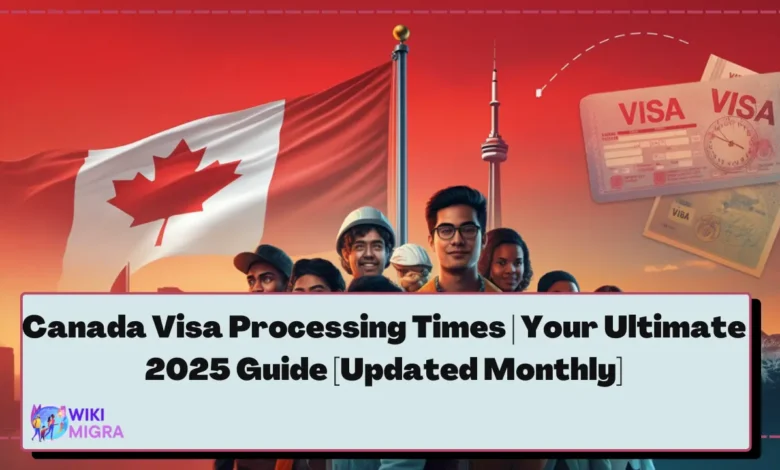
Waiting for a visa decision can feel like an eternity, especially when your plans to visit, study, work, or settle in Canada hinge on that approval. The uncertainty around Canada visa processing times often leaves applicants stressed and searching for answers. That’s why this guide exists—to give you a clear, up-to-date overview of IRCC processing times, explain the factors that influence delays, and show you how to check your Canada visa application status using the official Immigration, Refugees and Citizenship Canada (IRCC) tool.
Canada visa processing times vary significantly based on visa type, application completeness, and where you’re applying from. For the most accurate and current estimates, always use the official IRCC Processing Times tool. This guide breaks down the key factors, typical ranges, and actionable tips to help you navigate the process.
How to Check the Official IRCC Processing Times (Step-by-Step)
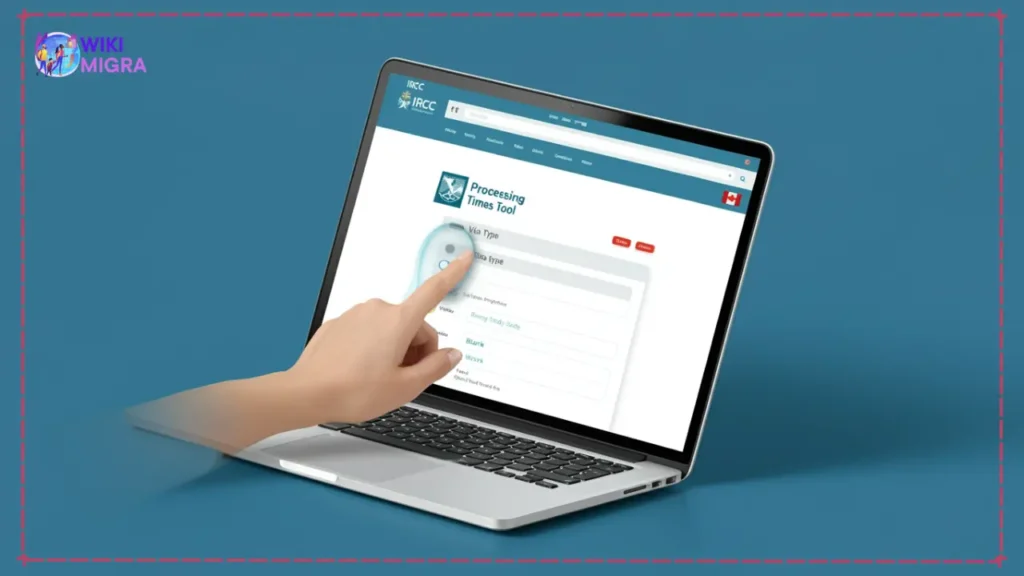
The only reliable source for check Canada visa processing time is the IRCC’s official tool. Here’s how to use it:
- Visit the Tool: Head to the IRCC Processing Times page.
- Select Your Application Type: Choose between temporary residence (visitor, study, work) or permanent residence (PR).
- Pick Your Specific Visa: Narrow it down—e.g., Canada visitor visa processing time, Canada work permit processing time, or Express Entry processing time.
- Enter Your Country: Processing times differ by location due to local visa office workloads.
- Review the Result: The tool shows an estimated time, typically reflecting when 80% of applications are finalized.
Pro Tip: Bookmark the tool and check it weekly, as latest IRCC processing time updates can shift based on demand or operational changes.
You may be interested in: Canada Immigration Plan 2025 | What You Need to Know (Updated Guide)
Key Factors Influencing Canada Visa Processing Times (Explained)
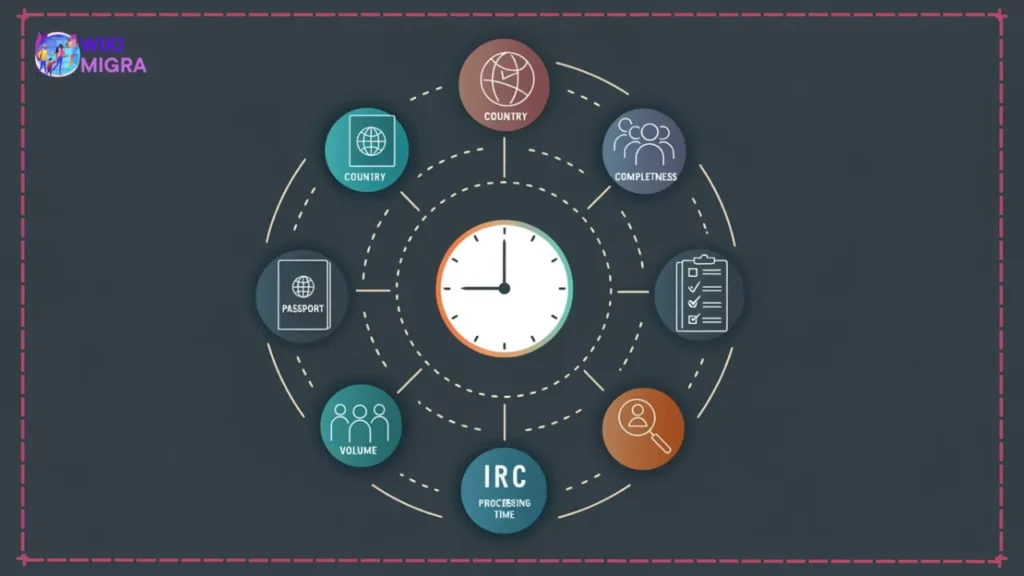
Why do Canada visa processing times differ so much? Several variables play a role. Let’s break them down:
Type of Application
- Visitor Visas: Simpler, often faster (weeks to months).
- Study/Work Permits: Moderate complexity, varies by documentation (months).
- Permanent Residence (e.g., Express Entry, PNP, Family Sponsorship): Highly complex, longer timelines (6 months to years).
Country of Application/Citizenship
- High-volume countries (e.g., India, Philippines) may face longer IRCC processing times due to demand.
- Local visa office capacity and security check requirements (e.g., interviews) also factor in.
Application Completeness & Accuracy
- Missing documents or errors? Expect delays. A complete, accurate application is your best defense against prolonged Canada visa processing times.
Volume of Applications
- Seasonal peaks (e.g., summer for visitor visas, fall for study permits) slow things down.
- Overall demand—like post-pandemic travel surges—can create backlogs.
IRCC Operational Capacity & Priorities
- Government shifts (e.g., prioritizing refugees) or system updates can adjust IRCC processing times.
- Staff shortages or tech upgrades occasionally disrupt flow.
Need for Additional Information/Verification
- Medical exams, biometrics, or background checks add time.
- If IRCC requests clarification, delays depend on how fast you respond.
Summary Table: Factors at a Glance
| Factor | Impact Level | Explanation |
|---|---|---|
| Application Type | High | Complexity drives timelines. |
| Country of Origin | High | Volume and local capacity matter. |
| Completeness | High | Errors or gaps = delays. |
| Application Volume | Medium | Peaks overwhelm the system. |
| IRCC Capacity | Medium | Internal priorities shift focus. |
| Extra Verification | Medium | Depends on case specifics. |
Understanding these factors affecting visa processing time Canada empowers you to plan smarter.
Estimated Processing Times by Popular Visa Category
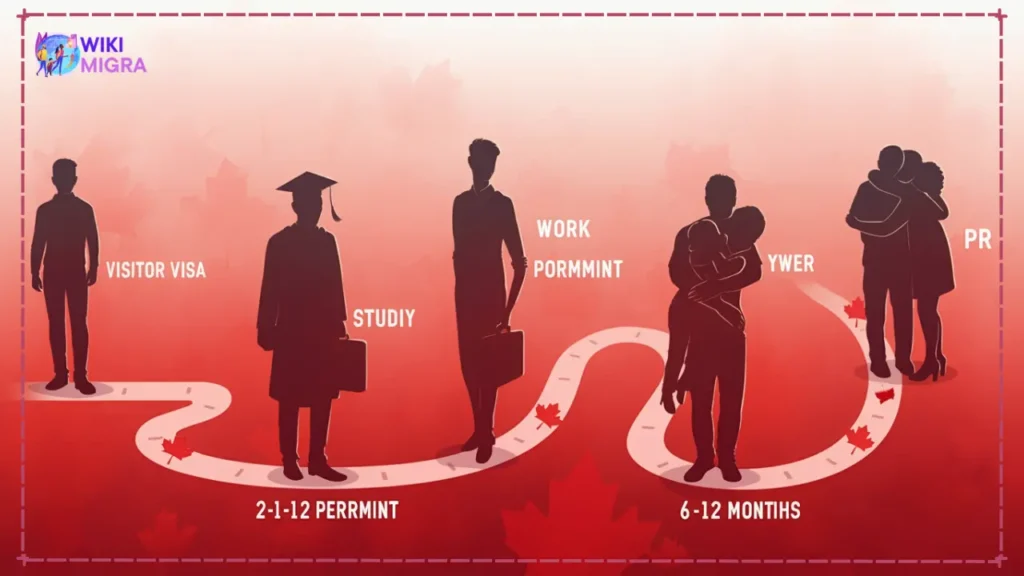
Disclaimer: These are estimates based on recent trends as of March 28, 2025. For exact Canada visa processing times, refer to the IRCC tool. Last checked: March 2025.
Temporary Resident Visas (TRV)
- Visitor Visa: 2-12 weeks (varies by country).
- Super Visa: 8-24 weeks (for parents/grandparents; slower due to medical checks).
Study Permits
- Inside Canada: 4-12 weeks.
- Outside Canada: 8-20 weeks.
- Student Direct Stream (SDS): 2-6 weeks (faster for eligible countries like India, China).
Work Permits
- LMIA-based: 10-24 weeks (Labor Market Impact Assessment adds time).
- LMIA-exempt (e.g., IEC, Open Work Permits): 4-16 weeks.
- Post-Graduation Work Permit (PGWP): 8-20 weeks.
Permanent Residence (PR) – Economic Class
- Express Entry (Post-ITA): 6-12 months (Express Entry processing time is relatively fast).
- Provincial Nominee Programs (PNP):
- Express Entry-linked: 6-12 months.
- Paper-based: 12-24 months (PNP processing time varies widely).
Permanent Residence (PR) – Family Sponsorship
- Spousal/Partner Sponsorship:
- Inland: 12-18 months.
- Outland: 10-16 months.
- Parent/Grandparent Sponsorship (PGP): 20-36 months (family sponsorship processing time Canada reflects high demand).
Other Categories
- Citizenship Applications: 12-24 months.
- PR Card Renewals: 6-12 weeks.
These ranges highlight why check Canada visa processing time regularly via the IRCC tool is critical—estimates evolve.
You may be interested in: Canada Startup Visa Latest News | Updates after the election of the new Canadian government
Understanding Delays: What if Your Application Exceeds Normal Processing Times?
Sometimes, your application outlasts the posted Canada visa processing times. Common culprits include:
- Complex Cases: Unusual circumstances needing extra review.
- Verification Delays: Slow security or background checks.
- IRCC Backlogs: System-wide slowdowns beyond your control.
If the standard time passes:
- Check your Canada visa application status via the IRCC portal.
- Submit a polite inquiry using the IRCC Web Form with your application number.
Patience is key—most delays resolve eventually, but proactive status checks keep you informed.
Can You Speed Up Your Canada Visa Application?
No magic “pay more, get it faster” button exists (sorry, myths debunked!). But you can influence how to speed up Canada visa application by:
- Submitting a Complete Application: Double-check documents before submission.
- Responding Promptly: Answer IRCC requests ASAP.
- Using Online Portals: Faster than paper where available (e.g., Express Entry).
- Prepping Early: Schedule biometrics or medicals proactively if required.
For urgent cases (e.g., humanitarian needs), contact IRCC directly—standard expedites are rare.
Canada Student Visa Processing Time
To determine the processing time for a Canadian student visa (study permit), it is essential to consider several factors, including the applicant’s country of residence, the completeness of the application, and whether additional steps like biometrics or medical exams are required. Below is a detailed breakdown of the processing times and influencing factors.
General Processing Times for Study Permits
The average processing time for a Canadian study permit is approximately 6 to 8 weeks (1.5 to 2 months). However, depending on specific circumstances such as the country of application and volume of applications received, it can take up to 3 months or longer.
Factors Influencing Processing Times
- Country of Application:
- The processing time varies significantly based on where you apply from. For example:
- Applications from India typically take about 8 weeks.
- Applications from Nigeria have improved significantly in recent years and now average around 7 weeks, compared to much longer times in previous years.
- African countries like Ghana and Morocco may experience processing times ranging from 11 to 16 weeks, depending on seasonal demand.
- The processing time varies significantly based on where you apply from. For example:
- Application Completeness:
- Submitting all required documents accurately and completely can help avoid delays.
- Missing documents or errors in your application may lead to requests for additional information, which can extend processing times.
- Biometrics and Medical Examinations:
- Applicants are often required to submit biometrics (fingerprints and photographs) at a Visa Application Centre (VAC). This step must be completed promptly after receiving instructions from Immigration, Refugees and Citizenship Canada (IRCC).
- Some applicants may also need an Immigration Medical Examination (IME), which can add time if not scheduled promptly.
- Volume of Applications:
- During peak periods (e.g., before academic terms starting in September or January), IRCC receives a higher volume of applications, which can increase wait times.
- Student Direct Stream (SDS):
- For applicants from eligible countries such as India, China, Vietnam, Pakistan, Senegal, and others under the SDS program, processing times are faster—typically within 20 calendar days, provided all requirements are met.
Specific Processing Times by Region
- India: Approximately 8 weeks under regular processing; SDS applications may take only 20 days.
- Nigeria: Improved significantly to an average of 7 weeks, down from over 36 weeks in prior years.
- Ghana & Morocco: Average between 11–16 weeks, depending on seasonal demand.
- Inside Canada Applications: Processing takes about 5 weeks, as there are fewer logistical delays compared to international submissions.
- Extensions Within Canada: Online extensions typically take around 75 days, while paper-based submissions may take up to 91 days.
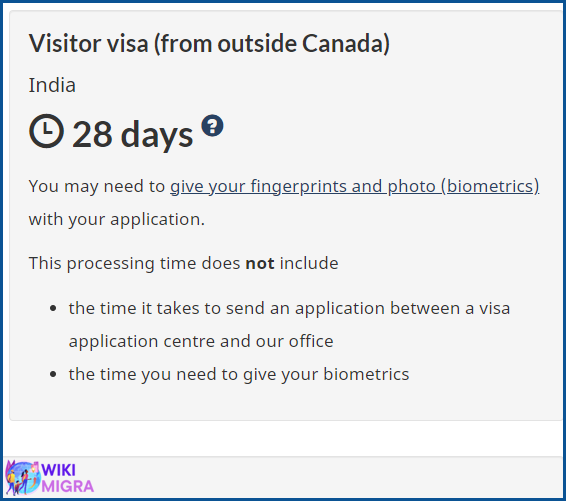
Steps to Minimize Delays
- Apply early—ideally at least 3–4 months before your intended start date.
- Ensure all required documents are complete and accurate:
- Letter of acceptance from a Designated Learning Institution (DLI).
- Proof of financial support meeting updated thresholds ($20,635 CAD annually starting January 2025).
- Biometrics submission confirmation.
- Respond promptly to any additional document requests or follow-ups from IRCC.
- Use online submission portals rather than paper-based applications for faster processing.
The standard processing time for a Canadian student visa ranges between 6–8 weeks but can vary based on factors like country of application, completeness of documents, biometrics/medical exam requirements, and seasonal demand. Applicants using the Student Direct Stream (SDS) may receive decisions within just 20 days if eligible.
Check out the estimated Canada visa processing time from India for various visa types:
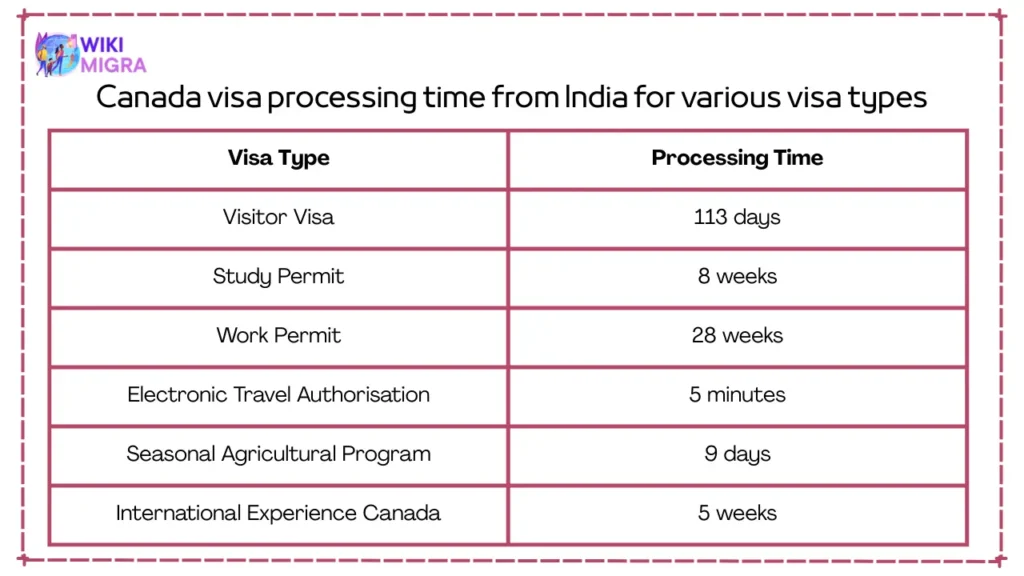
Canada Visit Visa Processing Time from Dubai
To determine the processing time for a Canada visit visa from Dubai, it is essential to consider several factors such as the completeness of the application, the volume of applications being processed, and whether additional steps like biometrics or interviews are required. Below is a detailed breakdown based on authoritative sources.
Step 1: General Processing Time for Visitor Visas
The processing time for a Canada visitor visa (Temporary Resident Visa) from Dubai is typically calculated based on historical data and updated weekly by Immigration, Refugees, and Citizenship Canada (IRCC). This time reflects how long it takes to process 80% of applications under normal conditions.
The average processing time for a Canada visit visa from Dubai is approximately 22-28 days.
Step 2: Factors Affecting Processing Times
Several factors can influence the processing time:
- Completeness of Application: If your application is incomplete or contains errors, it may be delayed or even refused.
- Biometrics Submission: Applicants are required to submit biometrics (fingerprints and photo). Delays in scheduling or attending the biometrics appointment can extend the overall timeline.
- Volume of Applications: During peak travel seasons or holidays, there may be an influx of applications that could increase processing times.
- Additional Requirements: If IRCC requests further documentation, medical exams, police certificates, or interviews, this will add to the total processing duration.
- Mailing Time: If you apply via paper submission rather than online, mailing times between Dubai and Canadian visa offices can add extra weeks.
Step 3: Biometrics and Final Decision
After submitting biometrics:
- The decision-making process usually takes an additional 2-4 weeks, provided no further information is requested by IRCC.
Step 4: Variations in Reported Timelines
Different sources report slightly varying timelines:
- Some applicants have reported receiving decisions within 22 days if their application was complete and submitted online.
- Others have experienced delays extending up to 28 days due to background checks or seasonal backlogs.
The average processing time for a Canada visit visa from Dubai is between 22 to 28 days, depending on factors such as application completeness, biometric submission timing, and seasonal demand.
Canada.ca – Visitor Visa Application Steps
Canada Spouse Visa Processing Time in 2025
The processing time for a Canada spouse visa in 2025 varies depending on whether the application is submitted under the Inland Sponsorship or Outland Sponsorship category, as well as other factors such as the completeness of the application and the applicant’s country of residence. Below is a detailed breakdown of current timelines and influencing factors.
Inland Spousal Sponsorship Processing Time
Inland spousal sponsorship refers to cases where the sponsored spouse is already residing in Canada. This category allows the sponsored spouse to apply for an Open Work Permit (OWP) while waiting for permanent residency approval.
- Processing Time:
24 months (as updated in January 2025).
This increase from the previous standard of 12 months reflects higher application volumes and operational challenges faced by Immigration, Refugees, and Citizenship Canada (IRCC).
Outland Spousal Sponsorship Processing Time
Outland spousal sponsorship applies when the sponsored spouse resides outside Canada during the application process. These applications are processed through visa offices abroad.
- Processing Time:
10 months (for most countries, excluding Quebec-specific cases).
For applicants residing in Quebec, additional provincial coordination may extend processing times to approximately 36 months.
Factors Affecting Processing Times
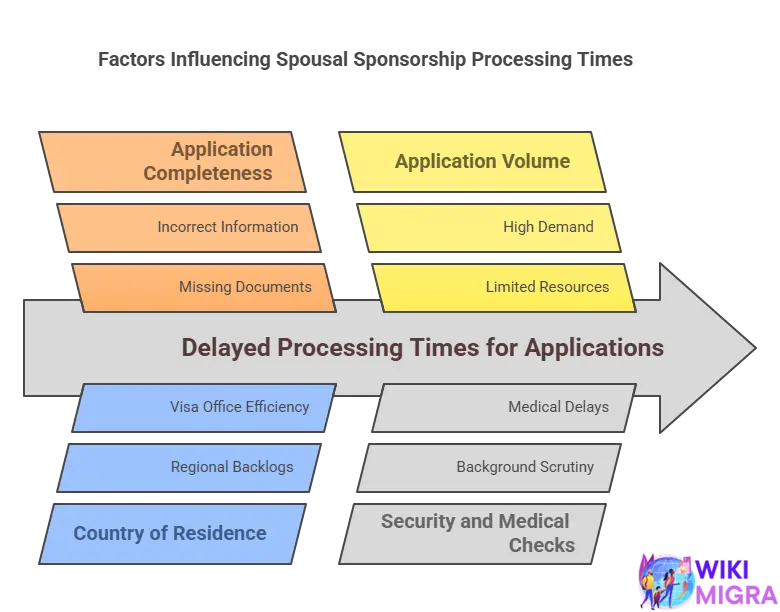
Several factors can influence how long it takes to process a spousal sponsorship application:
- Completeness of Application: Missing or incorrect documents can lead to delays.
- Country of Residence: Applications processed through certain visa offices may take longer due to regional backlogs.
- Volume of Applications: High demand for family reunification programs can extend wait times.
- Security and Background Checks: Additional scrutiny may be required for some applicants.
- Medical Examinations and Biometrics: Delays in completing these steps can impact overall timelines.
Recent Changes in Processing Times
As of early 2025, IRCC has made adjustments to processing times due to increased demand:
- Inland sponsorship timelines have doubled from 12 months to 24 months.
- Outland sponsorship remains faster at approximately 10 months but varies by region.
- Quebec-specific applications require additional coordination with provincial authorities, leading to extended timelines up to 36 months.
How to Check Your Application Status
Applicants can monitor their spousal sponsorship application status online using IRCC’s official tools:
- Visit IRCC’s Online Application Tracker.
- Enter your unique client identifier (UCI) or application number provided by IRCC.
- Regularly check email updates for requests for additional documents or instructions.
Tips to Avoid Delays
To ensure faster processing, follow these guidelines:
- Submit a complete and accurate application with all required forms and supporting documents.
- Respond promptly to any requests from IRCC for additional information or documentation.
- Complete biometrics and medical examinations within specified deadlines.
- Use IRCC’s document checklist (IMM5533) tailored for your country of residence.
Summary: Current Spouse Visa Processing Times in 2025
- Inland Sponsorship:
24 months - Outland Sponsorship:
10 months (most countries)
Up to 36 months for Quebec-specific cases.
These timelines reflect estimates based on data available as of March 2025 and are subject to change depending on individual circumstances and IRCC’s operational capacity.
Sources:
- Canada Immigration News – March Update
- Right Way Canada – Spousal Sponsorship
- ICC Immigration – March Overview
Conclusion: Navigating Canada visa processing times doesn’t have to be a mystery. Timelines fluctuate based on visa type, your location, and how airtight your application is—so always lean on the IRCC Processing Times tool for the latest scoop. Submit complete, accurate applications, and you’ll set yourself up for smoother sailing.





